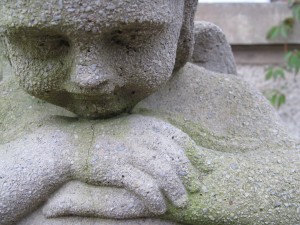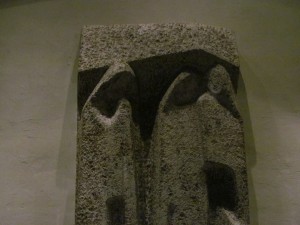“Let’s talk stories. My guess is that we all have a story of a woman whose leadership or teaching has changed our lives.”
There seems to be a lot out there in the blogosphere on women and leadership these days. Thankfully the tenor seems to be transitioning from the polarizing extremes to some very thoughtful discourse.
For some reason though, I am realizing that the conversation being offered isn’t the one I’m most drawn to.
Complementarian, egalitarian. They both seem to narrow wisdom to a single voice: one through hierarchy; the other through sameness. Even beyond that, both seem to be struggling over structural organizational posturing words like “leader” and “teacher.” And though such conversations are, of course, necessary within the structure of the church, I wonder if we are approaching this sometimes difficult dialogue with all the wisdom and resources available to us. Most of these discussions speak about concept and precept rather than story. Most seek to engage truth and goodness, but I don’t see much beauty. (Check out this interesting video blog by Tripp Huggins that references the “three sisters” of theology: truth, goodness, and beauty)
Yet,when I look at the stories of women in the Bible, I have an altogether different response. I don’t find myself captivated by the truth and goodness issues of the social injustice suffered by the women. (Maybe justice issues are just too painful for me.) Instead I am drawn to the beauty I see in their stories. I am fascinated by how much they did with the “crumbs” they were offered. I see these women as the powerful water whose path was shaped by the rock, with the water in time proven to be just as powerfully shaping for the rock. This is the conversation that intrigues me most. It is the en-storied wisdom of the oft-underestimated power of nurturing that is more organic than hierarchical, more experiential and demonstrative than word-centered. This is the mystery of the observation that the “hand that rocks the cradle, rules the world.” It feels to me like the larger story beneath the smaller story of who gets the most power-full title. This is the moment when being able to do the work before us without needing the name attached is our brilliance.
We know that women were present throughout Jesus’ ministry and they also provided for the band of disciples out of their own resources (Luke 8:2-4). Provider? Leader? We know women were often publicly affirmed as good, their lives taught others important wisdom… like the widow with two mites (Luke 21: 1-4) or the woman who anointed him whose story would be told in memory of her (Matthew 26: 6-13) or Mary of Bethany (Luke 10: 38-42) when she boldly sat to learn as the student of this Rabbi.
Jesus regarded women as leaders and teachers but he did not name them as such. Instead, He introduced them to their own power over and over, one face-to-face encounter at a time:
The woman with the hemorrhage whose own faith made her whole when she came forward, in fear and trembling, and told her story. (Luke 8)
The Syro-Phoenician woman whose faith-full reply was the reason for the daughter’s healing. (Mark 7:24-30)
The woman at the well who met the long-awaited Messiah face to face and changed her city with her own story. (John 4)
Mary Magdalene whose tears became joy and voice became the first to announce the resurrection. (John 20:11-18)
We can see Jesus’ absence of naming as an omission, maybe as a cultural calculation, or as a deeper wisdom. Could it be that he was highlighting a deeper ground of identity than position or title, allowing them, in the absence of a title, to experience a powerful stance from which they could love in transforming ways no matter how they were regarded by society? Could it be that he was communicating more through the story of women than single, identifying words would have been able to communicate?
It also makes me think of how Jesus dealt with the politics of his day. He refused to take named positions or make alliances with structures but instead en-storied postures: with coin in hand, “give to Caesar what is Caesar’s.” Was he saying that politics did not matter or was he pointing to the deeper conversation that simply mattered so much more?
Interestingly, most of Scripture is given to us in story form. It could be said that God en-storied God’s self in Jesus. As my favorite Southern Baptist preacher, Henry Blackaby teaches, Truth is a person not a concept or precept. People are always perceived in the context of story.
Though I do believe we need to have this conversation about our social and church constructs and naming and positions of power, that is not the conversation I am most interested in at this moment. First, I want to talk about the deeper reality of the significant, loving work of women in the early community and today (no matter how they are described in language, position, and title.) Let’s talk stories. My guess is that we all have a story of a woman whose leadership or teaching has changed our lives. We have all also known moments when God introduced us to our own power to heal and to love in such a way that the world is different. And when that truth, reality, and wisdom becomes the context in which we live, I am guessing the other conversation will be a lot easier to sort out.
How have the women you have known lead you? What have they taught you? Where has Jesus introduced you to your own power to change the world?















